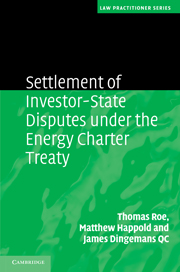Book contents
- Frontmatter
- Contents
- Foreword
- Preface
- Table of cases
- 1 Introduction
- 2 The applicable law
- 3 Availability of dispute settlement under Article 26
- 4 European Union law and the Energy Charter Treaty
- 5 Substantive law
- 6 Procedure
- 7 Contracting Parties' international responsibility for breaches of Part III of the ECT
- 8 Taxation
- Appendix A Selected provisions of the Energy Charter Treaty
- Appendix B Signatories to the Energy Charter Treaty
- Bibliography
- Index
Preface
Published online by Cambridge University Press: 05 July 2011
- Frontmatter
- Contents
- Foreword
- Preface
- Table of cases
- 1 Introduction
- 2 The applicable law
- 3 Availability of dispute settlement under Article 26
- 4 European Union law and the Energy Charter Treaty
- 5 Substantive law
- 6 Procedure
- 7 Contracting Parties' international responsibility for breaches of Part III of the ECT
- 8 Taxation
- Appendix A Selected provisions of the Energy Charter Treaty
- Appendix B Signatories to the Energy Charter Treaty
- Bibliography
- Index
Summary
The difficulties which face the scholar or practitioner of international investment law in the second decade of the twenty-first century do not include a lack of reading material. The authors of a further contribution ought therefore to begin with a defence of their decision to make it.
Ours, put shortly, is that the Energy Charter Treaty's provisions on investor–state dispute settlement deserve an up-to-date study of their own. Although the Treaty is limited in its application to just one field of international investment – energy – that field is of great significance and sensitivity, and is one in which the interests of states in attracting foreign investment on the one hand and on the other in regulating the conduct of foreign investors are inevitably in a state of real or potential tension. And what it lacks in breadth of subject-matter the Energy Charter Treaty makes up for in the number of its signatories: some forty-six countries and the European Union are parties (another state applies the Treaty provisionally and Russia must apply the Treaty for twenty years to all investments made until 18 October 2009). The Energy Charter Treaty is, in short, a very important treaty whose provisions ought to be well understood by all parties and by all relevant investors. Yet in truth the Treaty is not always easy to understand and the meaning of many of its provisions remains obscure.
In writing this study we have had three main aims.
- Type
- Chapter
- Information
- Publisher: Cambridge University PressPrint publication year: 2011

